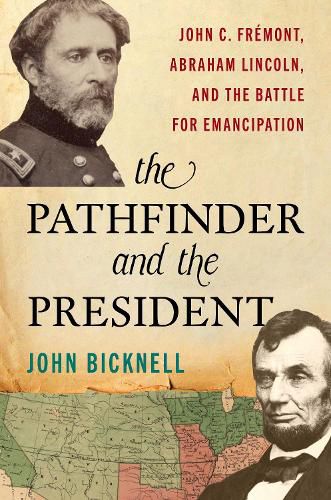Readings Newsletter
Become a Readings Member to make your shopping experience even easier.
Sign in or sign up for free!
You’re not far away from qualifying for FREE standard shipping within Australia
You’ve qualified for FREE standard shipping within Australia
The cart is loading…






In 1856 the fledgling Republican party nominated as its first candidate for president John C. Fremont, the dashing explorer of the American West known as the Pathfinder and a radical opponent of slavery. He lost, but when the Civil War broke out, Lincoln tapped him for high command, setting the two on a collision course over how to deal with slavery during the conflict. The Pathfinder and the President explores their volatile relationship in all its political and military dimensions as well as its effects on the Civil War and the battle for emancipation.
Lincoln had not supported Fremont's nomination in 1856, favoring a more moderate Republican, but when the war came, the president recognized his importance - his morale-boosting value as a national celebrity and his political value as an ally of Radical Republicans - and gave Fremont command of the Department of the West, with the task of defending the vital border state of Missouri. There Fremont lived extravagantly, commanded like a tyrant, oversaw a fraud scandal, feuded with the state's political leaders, and struggled with seesawing guerrilla warfare. Desperate to break the stalemate, Fremont in August 1861 proclaimed the emancipation of all rebel slaves. Lincoln reacted swiftly, fearing that such a move would drive Missouri and other border states to secede, and revoked the order, firing the recalcitrant Fremont shortly thereafter, at some political cost amongst Radical Republicans, who launched an investigation while continuing to lobby for Fremont and swift emancipation.
Within four months, the Pathfinder was back, this time to command in the Appalachians, where he proved no match for Stonewall Jackson in the Shenandoah Valley. He never commanded again. Lincoln soon issued the Emancipation Proclamation, his thinking on the subject having been shaped by the Fremont affair. In the 1864 election, Fremont ran on the anti-Lincoln Radical Democracy Party, withdrawing before the election in a compromise that also removed a hated rival from Lincoln's cabinet, ending his involvement in the Civil War.
Fremont had lost two commands, every battle in which he fought, a presidential campaign, a good portion of his personal fortune, and much of his reputation, yet Lincoln still compared him to Moses and praised him as a pioneer-a pathfinder-for emancipation. Fremont's is an important-and never dull-story, and in telling it, John Bicknell gives us a better understanding of not only Fremont, but also Lincoln, emancipation, and the Civil War.
$9.00 standard shipping within Australia
FREE standard shipping within Australia for orders over $100.00
Express & International shipping calculated at checkout
Stock availability can be subject to change without notice. We recommend calling the shop or contacting our online team to check availability of low stock items. Please see our Shopping Online page for more details.
In 1856 the fledgling Republican party nominated as its first candidate for president John C. Fremont, the dashing explorer of the American West known as the Pathfinder and a radical opponent of slavery. He lost, but when the Civil War broke out, Lincoln tapped him for high command, setting the two on a collision course over how to deal with slavery during the conflict. The Pathfinder and the President explores their volatile relationship in all its political and military dimensions as well as its effects on the Civil War and the battle for emancipation.
Lincoln had not supported Fremont's nomination in 1856, favoring a more moderate Republican, but when the war came, the president recognized his importance - his morale-boosting value as a national celebrity and his political value as an ally of Radical Republicans - and gave Fremont command of the Department of the West, with the task of defending the vital border state of Missouri. There Fremont lived extravagantly, commanded like a tyrant, oversaw a fraud scandal, feuded with the state's political leaders, and struggled with seesawing guerrilla warfare. Desperate to break the stalemate, Fremont in August 1861 proclaimed the emancipation of all rebel slaves. Lincoln reacted swiftly, fearing that such a move would drive Missouri and other border states to secede, and revoked the order, firing the recalcitrant Fremont shortly thereafter, at some political cost amongst Radical Republicans, who launched an investigation while continuing to lobby for Fremont and swift emancipation.
Within four months, the Pathfinder was back, this time to command in the Appalachians, where he proved no match for Stonewall Jackson in the Shenandoah Valley. He never commanded again. Lincoln soon issued the Emancipation Proclamation, his thinking on the subject having been shaped by the Fremont affair. In the 1864 election, Fremont ran on the anti-Lincoln Radical Democracy Party, withdrawing before the election in a compromise that also removed a hated rival from Lincoln's cabinet, ending his involvement in the Civil War.
Fremont had lost two commands, every battle in which he fought, a presidential campaign, a good portion of his personal fortune, and much of his reputation, yet Lincoln still compared him to Moses and praised him as a pioneer-a pathfinder-for emancipation. Fremont's is an important-and never dull-story, and in telling it, John Bicknell gives us a better understanding of not only Fremont, but also Lincoln, emancipation, and the Civil War.